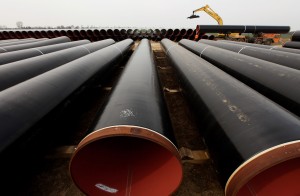 For years TransCanada has tried to have their Keystone XL Pipeline project approved by the U.S. government. Originally the proposal was denied by former President Obama, but after the election this year President Trump enacted an executive order bringing the proposal back to the surface.
For years TransCanada has tried to have their Keystone XL Pipeline project approved by the U.S. government. Originally the proposal was denied by former President Obama, but after the election this year President Trump enacted an executive order bringing the proposal back to the surface.
Since the projects reintroduction to the forefront of climate and energy policy, President Trump has approved the pipeline and intends to begin the project as soon as possible. Not only is this an aggressive policy move, but also, a defining moment in the Trump Administration’s energy policy as a whole. President Trump is proving his commitment to campaign promises supporting domestic manufacturing, energy production, and infrastructure.
Trump’s Administration is citing several benefits of pursuing the project. Primarily, the goal of the deal is to promote U.S. energy independence. Supporters hope that the completion of this project will decrease foreign oil dependence and increase the available domestic supply. In addition to energy independence, President Trump aims to create new jobs for the American people, which was also a large part of his campaign platform. The pipeline is set to begin in Canada and travel through Montana, South Dakota, Nebraska, and end on the Gulf Coast. Supporters believe the project has the potential to create many new jobs around the pipeline in terms of construction, operation, and maintenance. The project is also set to support President Trump’s commitment to American manufacturing. TransCanada has announced that more than half of the steel used in the construction of the pipeline will come from U.S. steel producers. The Administration is also aiming to maintain its campaign promises seeking to look out for families in the U.S. President Trump expressed his interest in lowering energy costs for working families, and this project is one way he intends to act on that statement.
President Trump’s Keystone XL approval has not brought all positive feedback. In fact, the decision to move forward with the proposal has resulted in a great deal of opposition. Landowners surrounding the intended construction site are already preparing to push back on the recent approval. Environmental groups are also members of the opposition. They fear that the pipeline project will severely damage the water supply in affected states in addition to concerns of greater energy usage. Beyond greater energy usage, environmental groups are very worried that this pipeline will open the door for deeper climate change issues. Also, the approval of this project has caused people to wonder if the Keystone XL Pipeline project is opening the door for several other similar projects. If that becomes the case, the threat of climate change and other negative environmental issues will increase significantly. People in opposition to this project are also skeptical of President Trump’s assurance that the pipeline construction will create meaningful jobs. Some analysts have predicted that the construction of the project will create an estimated 42,000 jobs for only two years. Post construction, estimates state that only 35 permanent employees will be necessary for operations, calling the supposed benefit of job creation into question.
Regardless of your position on the matter, the approval of this project provides a clearer outline of the energy policy we can expect from this administration. Energy independence, support for U.S. energy companies, development of new infrastructure, support for manufacturing, and focus on the American family are all going to be key characteristics of the energy policy President Trump seeks to push forward.
